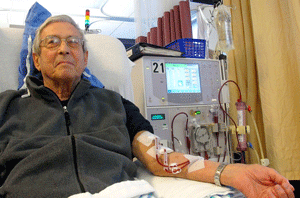July 20, 2012
By Joe Maniscalco
Union fears that the Health And Hospitals Corporation is about to “destroy the village in order to save it,” fell on deaf ears on Thursday when an HHC Board of Directors committee on Medical and Professional Affairs unanimously voted in favor of a resolution privatizing dialysis services at nine more public hospitals throughout the city.
“This privatization effort will harm patients,” New York State Nursing Association representative Leon Bell told the HHC committee. “You have less RN time and less caregiver time. We’re not talking about slight variations, we’re talking about drastic variations, and the result will necessarily be a decline in quality and quantity of care that’s available to the patient population.”
Opponents of the privatization plan – already in effect at two hospitals in the HHC system – argue that declining care will fall as much as 20 percent should the contract with Atlantic Dialysis Management ultimately be approved on July 26.
“I think in terms of the patient care resources and caregiver time that’s going to be available to patients, it’s quite clear that we’re talking about huge reductions in RN time in particular, and total caregiver time in general,” Bell emphasized.
 DC37 representative Moira Dolan also implored the HHC committee to reconsider the privatization plan, pointing out that four Atlantic Dialysis Management centers presently operating around the city scored “worse” than expected patient outcomes in a recent study.
DC37 representative Moira Dolan also implored the HHC committee to reconsider the privatization plan, pointing out that four Atlantic Dialysis Management centers presently operating around the city scored “worse” than expected patient outcomes in a recent study.
“Reduced staffing with high needs patients will affect quality,” Dolan warned.
HHC claims that that its present model of dialysis delivery is costing the system some $24 million annually – money it can ill afford to lose.
But Dolan challenged the HHC’s assertion that inking a nine-year outsourcing contract with Atlantic Dialysis Management will result in huge savings totaling roughly $147 million.
“How does the vendor achieve savings?” Dolan observed. “The wholly privatized model reduces the total staffed hours per patient.”
In addition to threatening quality care, unions representing hospital staffers also fear that further privatizing the HHC system will eventually mean the loss of good paying union jobs with health insurance and retirement security, thus contributing to an already depressed economy.
None of that, however, seemed to move members of the HHC committee who were reminded that most hospitals around the country have already privatized their dialysis units.
“There is nothing unusual about what’s being done here,” Chairperson Dr. Michael Stocker said. “If anything, it’s starting to become unusual about the things we don’t do that the rest of the hospital industry does.”
Earlier calls to opt for other cost-cutting alternatives to privatization were rejected.
Despite arguments to the contrary, HHC officials say that the quality of service currently being provided at privatized treatment centers is “at or above” where it needs to be. In future, they argue that system managers will be able to maintain oversight of the privatized treatment centers and act accordingly, if necessary.
“The dollars we save here go to take care of other people that have other medical needs,” Dr. Stocker added.
A visibly dejected Judy Wessler, director of the Commission on the Public’s Health System (CPHS), was hardly surprised by the outcome, but vowed to keep up the fight to block further privatization.
“I think it’s too bad that there weren’t more questions [from other board members], ” she said.
“There are studies out there that show private for-profit dialysis chains have higher mortality rates,” Dolan said. “And I believe that this business model will in fact bear that out.”



